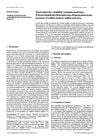 19 citations,
October 2017 in “The FASEB Journal”
19 citations,
October 2017 in “The FASEB Journal” Male hormones cause different growth in identical human hair follicles due to their unique epigenetic characteristics.
 13 citations,
December 1991 in “Annals of the New York Academy of Sciences”
13 citations,
December 1991 in “Annals of the New York Academy of Sciences” Researchers created a lab model to study human hair growth, showing it can grow and self-regulate outside the body.
 2 citations,
January 2016 in “Springer eBooks”
2 citations,
January 2016 in “Springer eBooks” Fat tissue stem cells show promise for repairing different body tissues and are being tested in clinical trials.
 January 2011 in “Healthcare Informatics Research”
January 2011 in “Healthcare Informatics Research” Hair loss is significantly linked to symptoms like dry hair, scalp issues, addiction to tobacco or coffee, anxiety, and digestive problems.
 1 citations,
November 2015 in “Indian Journal of Clinical Biochemistry”
1 citations,
November 2015 in “Indian Journal of Clinical Biochemistry” The conference presented findings on how vitamin D levels, genetic factors, and lifestyle choices like smoking and yoga affect various health conditions and diseases.
86 citations,
May 2002 in “Journal of Investigative Dermatology” A new keratin, hK6irs1, is found in all layers of the hair follicle's inner root sheath.
 May 2023 in “Clinical, Cosmetic and Investigational Dermatology”
May 2023 in “Clinical, Cosmetic and Investigational Dermatology” The research found proteins in human skin cells that help with wound healing and hair growth, which could lead to new treatments.
89 citations,
October 2003 in “Biology of the Cell” Galectin-1 helps in RNA processing in cell nuclei.
29 citations,
April 2003 in “Experimental dermatology” Human hair follicles grown in vitro maintain normal keratin patterns and structure.
 15 citations,
January 1987 in “Electrophoresis”
15 citations,
January 1987 in “Electrophoresis” Human head hair proteins can be typed into eight distinct patterns, useful for genetic and forensic investigations.
 11 citations,
January 1987 in “Electrophoresis”
11 citations,
January 1987 in “Electrophoresis” Keratin proteins are consistent across different hair types from the same person.
 45 citations,
October 2014 in “Stem cell research & therapy”
45 citations,
October 2014 in “Stem cell research & therapy” Modified rat stem cells on a special scaffold improved blood vessel formation and wound healing in skin substitutes.

Human hair keratins can be turned into useful 3D biomedical scaffolds through a freeze-thaw process.
 467 citations,
October 2014 in “European Journal of Endocrinology”
467 citations,
October 2014 in “European Journal of Endocrinology” The European Society of Endocrinology advises individualized long-term management for PCOS, focusing on lifestyle changes, accurate diagnosis, and treatments for associated health risks and symptoms.
 58 citations,
January 2013 in “The Journal of Clinical Endocrinology and Metabolism”
58 citations,
January 2013 in “The Journal of Clinical Endocrinology and Metabolism” Obese women with PCOS show a male-like pattern in certain fat tissue gene expressions.
 7 citations,
March 2023 in “Antioxidants”
7 citations,
March 2023 in “Antioxidants” Rosemary may help treat various skin conditions due to its antioxidant and anti-inflammatory properties.
20 citations,
February 1994 in “In vitro cellular & developmental biology. Animal” Wool follicles can grow in a lab with the right nutrients and conditions.
 14 citations,
May 2008 in “Journal of proteome research”
14 citations,
May 2008 in “Journal of proteome research” Dutasteride may help reduce brain plaque linked to Alzheimer's by affecting cell energy structures and waste removal.
 6 citations,
June 2011 in “British Journal of Dermatology”
6 citations,
June 2011 in “British Journal of Dermatology” People with alopecia areata have higher levels of RBP4 protein and antibodies against it.
 258 citations,
July 2016 in “Reproductive Biology and Endocrinology”
258 citations,
July 2016 in “Reproductive Biology and Endocrinology” The document concludes that insulin resistance is key in PCOS development and early treatment is crucial to prevent complications.
 20 citations,
June 2012 in “British Journal of Dermatology”
20 citations,
June 2012 in “British Journal of Dermatology” Bleaching hair damages protein structure, especially keratin, leading to weakened hair.
 43 citations,
July 2012 in “Molecular human reproduction”
43 citations,
July 2012 in “Molecular human reproduction” Certain metabolites are lower in women with PCOS and could be potential markers for the condition.
 4 citations,
January 2017 in “Biological & pharmaceutical bulletin”
4 citations,
January 2017 in “Biological & pharmaceutical bulletin” Inhibiting ALOX12 can help hair cuticle maturation by increasing S100A3 citrullination.
 January 2022 in “Acta dermatovenerologica Alpina, Pannonica et Adriatica (Tiskana izd.)”
January 2022 in “Acta dermatovenerologica Alpina, Pannonica et Adriatica (Tiskana izd.)” Uncombable hair syndrome causes frizzy hair and can affect the nervous system, eyes, and ears, often co-occurring with other hair, skin, nail, and teeth conditions, and is linked to three specific gene mutations.
 18 citations,
February 2022 in “Cell Death Discovery”
18 citations,
February 2022 in “Cell Death Discovery” ECM1-modified stem cells can effectively treat liver cirrhosis.
 December 2023 in “Research in pharmacy”
December 2023 in “Research in pharmacy” Phytotherapeutic compounds and supplements can help manage Polycystic Ovarian Syndrome (PCOS).
21 citations,
November 2019 in “Molecular & Cellular Proteomics” Citrullinated proteins from Porphyromonas gingivalis may contribute to rheumatoid arthritis.
 2 citations,
May 2023 in “Current Nutrition Reports”
2 citations,
May 2023 in “Current Nutrition Reports” Eating a Mediterranean diet and taking certain supplements may improve symptoms of PCOS.

Human hair keratins can self-assemble and support cell growth, useful for biomedical applications.
29 citations,
October 2017 in “Journal of proteomics” The research found specific proteins that affect fiber characteristics and hair growth in sheep and goats.























